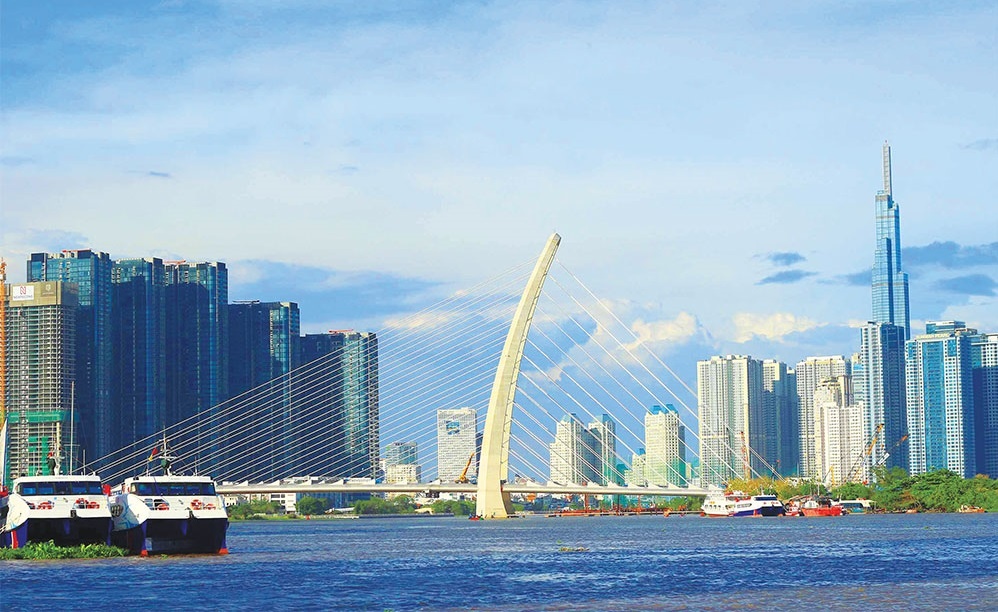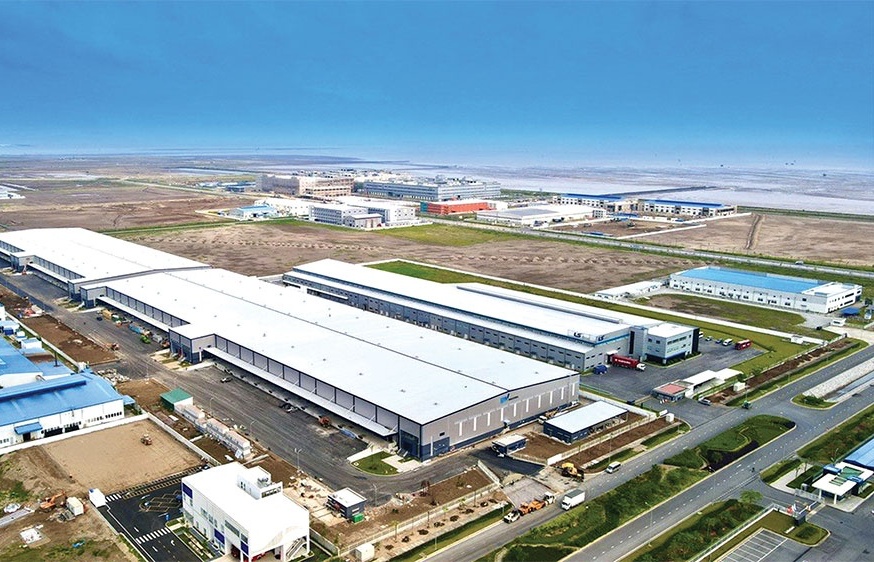Foreign groups retain interest in property
Foreign investment (FDI) in real estate so far in 2023 decreased by over 60 per cent to only $1.16 billion compared to the same period last year, according to the Foreign Investment Agency under the Ministry of Planning and Investment.
In recent years, Vietnam’s real estate industry has ranked second in terms of sectors attracting FDI. However, it has fallen to third this year thus far due to internal problems such as scarcity of supply and land, as well as legal complexities.
Although the figures for FDI into real estate are poor, there were still some huge transactions. Last month a Keppel consortium from Singapore entered into binding agreements to acquire 49 per cent interest of two adjacent residential projects in Thu Duc city from Khang Dien Group, for an aggregate of approximately $138 million.
 |
| Foreign groups retain interest in property, illustration photo/ Photo Le Toan |
Khang Dien Group holds the remaining 51 per cent, developing more than 200 homes and over 600 high-rise apartments on the two sites, which cover a total of 12 hectares.
According to Joseph Low, president of the Vietnam Real Estate Division at Keppel, the joint strategic acquisition is in line with Keppel’s asset-light business model, which enables it to tap into third-party funds for growth.
Japanese investors are also traditional players in Vietnamese real estate and have been ramping up interest this year. A seminar on understanding Vietnam’s real estate market was held in Tokyo in April, with the presence of more than 180 Japanese businesses. At the seminar, organised by Vinhomes together with VietnamGroove Real Estate Business Investment, Japanese parties said they appreciated the potential of the market in Vietnam.
Nobuaki Higashi, head of Overseas Sales at Nomura Real Estate Development, said that Nomura saw the potential in Vietnam’s property market because the country had a high economic growth rate in 2022, and a “golden age” population.
“The Vietnamese economy and the real estate market in particular will continue to grow strongly going forward,” said Higashi.
In Vietnam, Nomura is behind eight projects, providing a total of 24,000 apartments.
“We have proposed strategies that include investing in many different places but focusing on Ho Chi Minh City and Hanoi, and combining many forms of funding in housing, transport, and hotels. In the future, we will also consider investing in the development of villas,” Higashi said.
Meanwhile, Shin Aoki, an official from Urban Restoration Agency, said, “I know there are many Japanese businesses operating in Vietnam. Therefore, I am also truly interested in the Vietnamese market and want to learn about the market and opportunities there. We are aiming to cooperate with businesses in the apartment and condo sector and in town houses and hotels.”
Taiwan is also a big investor in real estate, including with the Phu My Hung venture, the biggest township in Vietnam. As one of the top five foreign investors in Vietnam in 2022, the Taiwanese are particularly keen on Vietnam’s industrial, office, and retail real estate segments.
At a seminar on real estate organised by Savills Vietnam in Taiwan in March, which welcomed 100 guests from diverse backgrounds, Savills managing director Neil MacGregor said some of the most successful projects in Vietnam were developed by Taiwanese investors, including Phu My Hung and Fei-Yueh’s successful Royal Centre and Nikko Hotel projects in Ho Chi Minh City.
“The strength of Taiwanese investors is their strong financial resources, business and product development experience, available customer base, and lower financial costs. We see this as a prime opportunity for the partnership between Vietnamese businesses and foreign backers,” MacGregor said.
Lang Xuan Truong, founder and CEO of Viettonkin Consulting, said that the demand for residential real estate in Vietnam would continue to rise as a result of the middle and upper classes’ rapid urbanisation.
“Large cities like Hanoi and Ho Chi Minh City continue to attract foreign investors who are looking at residential and commercial real estate. The demand for space leasing from data centres, e-commerce, and other industries will be what drives the office market,” Truong said.
Along with an increase in consumption and capital, the retail market is experiencing positive signs as the tourism sector is starting to recover, Truong added. “Due to their still-competitive prices in comparison to nearby markets like Singapore, Shanghai, and Shenzhen, Hanoi and Ho Chi Minh City are enjoying growing popularity.”
However, Truong pointed out, FDI into the real estate market faces many problems because of issues with the legal system surrounding the project development process, which causes delays in implementation.
“Condotels and officetels are two examples of new real estate segments for which comprehensive and prompt legal regulations have not yet been released. This has led to a discouraging reaction from many foreign investors who showed great interest previously,” he added.
In the foreseeable future, the housing craze and real estate prices will continue to rise due to the scarcity of available land in big cities, where FDI is mostly found.
“The fact that high-quality real estate projects are currently becoming scarcer and less well-publicised may trouble new investors in Vietnam. Therefore, they should seek the advice of qualified advisors with in-depth knowledge of the industry to understand the market and gain access to potential projects, or even form joint ventures with Vietnamese partners,” Truong said.
 | Investors wanted for social housing efforts Vietnam plans to mobilise different financial sources from society, especially from enterprises and foreign developers, to offer more social housing. |
 | Vietnam's industrial rents are rising swiftly Land and industrial infrastructure rental costs are increasing by approximately 10 to 15 per cent annually in Vietnam, but according to the most recent analysis by Vietnamese real estate market research firms, land rents for development and infrastructure in the country's industrial parks (IPs) remain competitive compared to other emerging markets. |
 | Procedures and practices to lure quality foreign investment Vietnam recorded total accumulated foreign direct investment of nearly $439 billion by the end of last year, of which accumulated capital in real estate reached $66.3 billion. Trang Le, head of Research and Consulting at JLL Vietnam, shared with VIR’s Binh An an assessment of the positive changes in the field in recent years. |
What the stars mean:
★ Poor ★ ★ Promising ★★★ Good ★★★★ Very good ★★★★★ Exceptional
Related Contents
Latest News
More News
- Construction firms poised for growth on public investment and capital market support (February 11, 2026 | 11:38)
- Mitsubishi acquires Thuan An 1 residential development from PDR (February 09, 2026 | 08:00)
- Frasers Property and GELEX Infrastructure propose new joint venture (February 07, 2026 | 15:00)
- Sun Group led consortium selected as investor for new urban area (February 06, 2026 | 15:20)
- Vietnam breaks into Top 10 countries and regions for LEED outside the US (February 05, 2026 | 17:56)
- Fairmont opens first Vietnam property in Hanoi (February 04, 2026 | 16:09)
- Real estate investment trusts pivotal for long-term success (February 02, 2026 | 11:09)
- Dong Nai experiences shifting expectations and new industrial cycle (January 28, 2026 | 09:00)
- An Phat 5 Industrial Park targets ESG-driven investors in Hai Phong (January 26, 2026 | 08:30)
- Decree opens incentives for green urban development (January 24, 2026 | 11:18)

 Tag:
Tag:





















 Mobile Version
Mobile Version